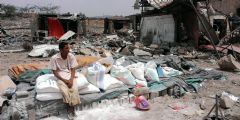Human Rights Voices
While the UN devotes its human rights operations to the demonization of the democratic state of Israel above all others and condemns the United States more often than the vast majority of non-democracies around the world, the voices of real victims around the world must be heard.
Saudi Arabia, April 7, 2016
Report: Saudi Coalition Used US Bomb in Yemen Market Strike That Killed 119
Original source
A Saudi-led coalition battling Shiite rebels and their allies in Yemen used a U.S.-supplied bomb in an airstrike last month on a market that killed at least 119 people, a human rights group said Thursday, further highlighting American involvement in the conflict.
The March 15 bombing targeting the northwestern town of Mastaba marked the second-deadliest airstrike conducted by the Saudi-helmed campaign since it began its war in March 2015. Condemned by the United Nations, the strike also wounded at least 47 people and left charred bodies lying next to flour sacks and twisted metal.
Human Rights Watch said its investigators traveled to the town in Yemen's Hajja province, controlled by the Shiite rebels known as Houthis, and found fragments of a GBU-31 satellite-guided bomb. The group said the bomb, as well as its guidance equipment, was supplied by the U.S., matching an earlier report by British television channel ITV.
"One of the deadliest strikes against civilians in Yemen's yearlong war involved U.S.-supplied weapons, illustrating tragically why countries should stop selling arms to Saudi Arabia," Priyanka Motaparthy, emergencies researcher at Human Rights Watch, said in a statement. "The U.S. and other coalition allies should send a clear message to Saudi Arabia that they want no part in unlawful killings of civilians."
U.S. Secretary of State John Kerry, visiting Bahrain on a trip to the Gulf island nation, declined to comment specifically on the report while speaking to reporters Thursday.
"I don't have any solid information, any documentation with respect to what weapon might have been used," Kerry said.
Kerry said he remained involved in efforts to secure a cease-fire in the war, but criticized Yemen's internationally recognized president, Abed Rabbo Mansour Hadi, for decisions in the "last few hours" that have set back mediation efforts. The American diplomat did not elaborate.
Hadi on Sunday fired his vice president and the head of his Cabinet, Khaled Bahah, over what he described as shortcomings in the performance of his government in exile. The Saudi-led coalition that supports Hadi has yet to retake Yemen's capital, Sanaa, which the Houthis seized in September 2014.
Saudi officials previously said they were investigating the strike, though they previously insisted most of the casualties were Houthi combatants.
The U.S. has backed the Saudi-led campaign in Yemen, where suspected American drones continue to target alleged members of al-Qaida in the Arabian Peninsula. In November, the U.S. approved a $1.29 billion rearming program for Saudi Arabia, including thousands of similar bombs.
The air campaign waged by the Saudi-led coalition in Yemen has been increasingly criticized by human rights activists over civilian deaths. Airstrikes account for 60 percent of the 3,200 civilians killed in the conflict, according to the U.N., which has criticized coalition strikes that have hit markets, clinics and hospitals.
The war in Yemen has killed over 6,000 people in total and left more than 80 percent of Yemenis in dire need of food, water and other aid as a result of the conflict in the Arab world's poorest country, the U.N. has said.

